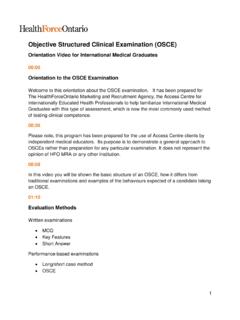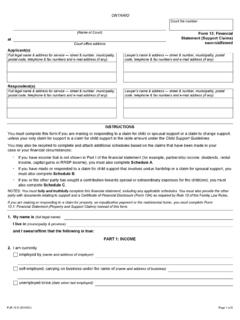Transcription of EMPLOYMENT RESOURCES STARTER KIT - Health Force …
1 EMPLOYMENT RESOURCES STARTER KIT April 2017 SEARCHSKILLSINTERVIEWAPPLICATIONCAREERGO ALQUALIFICATIONSE mployment RESOURCES STARTER Kit 1. Self Reflection and Reviewing Your Skills, Experiences, Strengths, and Interests 01a) Transferable Skills 01 b) Soft Skills 022. Exploring Your Options 03a) Find Titles of Occupations/Research the Labour Market 03b) Work in a Different Regulated Health Profession 04c) Non-Regulated Health Professions 05d) Non- Health Professional Field 053. Conducting Research and Exploring a New Career Path 06a) Explore Continuing Education, Undergraduate Options, Graduate Studies Options, and Student Loans 06b) Bridging Programs 07c) Research Labour Market 07d) Study Job Postings 10e) Networking 12f ) Informational Interviews 13g) Finding a Volunteer Opportunity 14h) Finding a Mentor 174.
2 Making a Decision and Setting Short- and Long-Term Goals 19a) Financial Elements to Consider 19b) Recognizing Opportunities 195. Job Search 20a) Determine Your Target Profession 20b) Tools for Job Search 21c) Job Search Methods 22d) Following up by Phone or Email 25e) Maintaining Records of All Interactions and Applications 25f ) Interviews 26g) Additional Support for Job Search 296. Coping with Stress 31 Contents01 EMPLOYMENT RESOURCES STARTER Kit Self Reflection and Reviewing Your Skills, Experiences, Strengths and Interests31 For many immigrants in ontario , becoming a licensed practitioner in one s past profession is a lengthy and difficult process.
3 For this reason, you may have decided to pursue another career option, which might include transferring current skills, education and work experience. This is often not an easy process, but nevertheless can provide both personal and professional meaning in the future. You may be asking yourself What are my transferable skills? Transferable skills are skills which are developed and used in one situation or occupation, but can also be transferred and used in another situation or occupation. They are often the key to which can best help guide you into the most intuitive, natural and logical alternative career. In order to better understand your own transferable skills, a good way to begin might be by completing a thorough inventory of your knowledge, competencies, and skills. Mapping out your skills, experiences, strengths and interests can be a useful exercise. These sites can help you do this:Transferable skills list: Careers by Skills and Knowledge: Skills RESOURCES STARTER Kit The phrase soft skills is often used to describe the skills that characterise relationships with other people or are about how you approach life and work, such as: communication, language, and personal habits.
4 Other phrases that are often used for these types of skills include: people skills, interpersonal skills, social skills, all of which are also a part of transferable skills. Hard skills , by contrast, is usually used to describe job-specific skills, which are generally easily quantifiable and measurable. Examples of such skills include professional skills such as: diagnosis and treatment, use of medical equipment, computer skills. Many of these can be learned and skills according to the Canadian cultural context are often some of the most difficult skills to develop for immigrants to Canada, even for those who have lived here for some time. This site can help guide you in defining and categorizing different potential soft skills: Laroche, , P. Eng., describes soft skills as abilities that are defined by culture and guided by arbitrary, unwritten social rules. In our professional lives, we are expected to handle them skillfully every day, but they don t come naturally to a person who has moved to a new country after spending a considerable part of their adulthood in a very different cultural Canadian employers believe a candidate with the right hard skills but poor soft skills won t be able to learn the soft skills required quickly enough to perform satisfactorily.
5 On the other hand, a person with the right soft skills has the potential to acquire the hard skills they may lack. Soft skills are such a priority for Canadian employers that the job interview process in Canada is mostly about determining soft skills. The most important soft skills an applicant can have includes dependability, communication, and and Social Development Canada (ESDC) has developed Working with Others Tip Sheet . This tool provides practical tips to help you improve your ability to working with Skills RESOURCES STARTER Kit Exploring Your Options32To explore a career option consider the goal that you would like to achieve and think about a strategy to get there. The following questions can be helpful in organizing your thoughts when considering a career option: What do you I want? (Type of career) What do I need to qualify for this job? (Experience, education etc.)
6 What steps do I need to take in order to obtain this position? (Logical goals) Find Titles of Occupations/Research the Labour can use the National Occupational Classification (NOC) to help you explore occupation titles. The NOC is a system used by the Government of Canada to classify jobs (occupations). Jobs are grouped based on the type of work a person does and the types of job NOC is a good starting point where you can enter different search words that best suit your intended occupation. A wide range of Health occupations are included in Category 3 of this link: RESOURCES STARTER Kit If you plan on pursuing a regulated Health profession that is different from your original profession, you need to find out whether some of your previous education and experience is transferable. Regulatory colleges may have competency profiles on their websites. In the majority of the cases, additional training and experience will be needed to qualify for registration with a regulatory practise in a regulated Health profession in ontario , an individual must be a member of the regulatory college for his/her chosen profession and hold a certificate of registration.
7 Regulated Health providers are required by law to deliver competent, ethical, and professional services, and are accountable to the public through their respective colleges. Regulatory colleges help to ensure excellence in care delivery. There are 26 regulatory colleges in ontario , and four colleges regulate more than one MRA offers information on practice requirements for each regulated Health profession: Educated Health Professionals may consider visiting HFO MRA for additional information; one-on-one advisory services; and joint orientation sessions with representatives from regulatory bodies, examining organizations, educational programs; and for other support Office of the Fairness Commissioner is an excellent resource to explore regulated Health professions in more depth and find out about updates on registration processes included in fair registration practices reports. These reports are submitted annually by individual regulatory colleges so the Fairness Commission is able to assess whether they provide adequate information to internationally trained individuals on the requirements necessary for registration and the procedure for applying.
8 For more information: in a Different Regulated Health RESOURCES STARTER Kit In exploring options in Health care, you might want to consider non-regulated Health -care professions. Non-regulated means you do not have to register with a regulatory college to work in that field. You may have the opportunity to use some of your skills, but will have minimal clinical interaction and clinical decision-making professions are not regulated by law, but may have voluntary professional bodies. In many cases, certification with these professional bodies is often valued within the profession and is important to finding EMPLOYMENT in the field. If you plan to take a course or program, make sure it will be recognized by the professional body and that it will lead to the certification you would like to skills you have utilized in the Health care profession, might be applied to many other rewarding careers that may not be related to Health .
9 You may have always had another passion and skills in another area that you are considering pursuing. For example, many people have decided to open their own private ProfessionsNon- Health Professional Field RESOURCES STARTER Kit Conducting Research and Exploring a New Career Path33 When exploring a new career path, keep an open mind while brainstorming and do not attach any immediate value judgments. Being open to exploration allows your mind to be open to Continuing Education, Undergraduate Options, Graduate Studies Options, and Student may be a helpful first step in beginning a new career. If you plan to apply to a Master s or a program, check admission requirements and contact program coordinators for clarification to help you prepare strong application portfolios and use your time/financial RESOURCES are RESOURCES to assist you with educational program exploration and choices.
10 You ll need to take many factors into consideration when returning to school. This settlement organization link provides tips on what to consider, including the length and relevance of your chosen program of study, and associated costs: #CUIF inancial Aid: How to Finance Your EducationYou are probably asking yourself, How will I pay for additional education? Below are some links to programs that provide loans for education:Micro Student LoansThis lender provides loans to pay for Canadian licensing or training. Student LoanThis is a government loan that freezes any interest payments until the borrower has completed his/her program. website is a resource that, depending on your individual situation, may generate a variety of potential scholarship and loan opportunities. Scholarships are lucrative because they give individuals financial support that does not have to be paid back.




